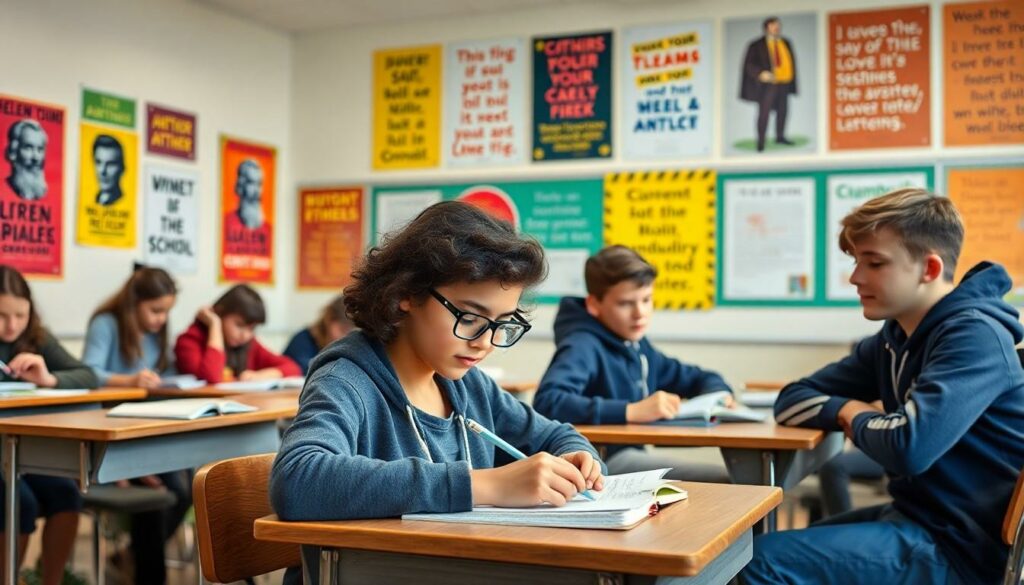High school can feel like a rollercoaster of emotions, and sometimes students need a little push to unleash their creativity. Enter creative writing prompts—the secret sauce to sparking imagination and banishing writer’s block faster than a math test on a Monday morning. Whether they’re crafting epic tales or exploring the depths of their feelings, these prompts can transform even the most reluctant writers into word wizards.
Table of Contents
ToggleBenefits Of Creative Writing Prompts For High School
Creative writing prompts offer valuable guidance for high school students, enhancing self-expression and refining writing skills. These prompts spark imagination and encourage students to explore different genres and writing styles.
Enhancing Creativity
Creative writing prompts stimulate original thought, allowing students to break free from conventional ideas. Each prompt encourages exploration of diverse themes and characters. Engaging with prompts often leads to unexpected narratives, igniting a passion for storytelling. By pushing boundaries, these activities foster innovation in writing. Students develop the ability to articulate unique perspectives, contributing to their overall creativity.
Improving Writing Skills
Improving writing skills occurs naturally through regular practice. Writing prompts compel students to write more frequently, helping to build confidence. Exposure to various prompts aids in mastering grammar and syntax. Constructing stories promotes clarity and conciseness in communication. Students learn to convey emotions effectively, appealing to their audience. Feedback from peers improves editing skills and critical thinking. These combined benefits create more proficient writers ready for advanced literary challenges.
Types Of Creative Writing Prompts

Creative writing prompts come in various forms, each targeting different styles and skills. High school students can explore fictional, non-fictional, and poetry prompts to enhance their writing versatility.
Fictional Prompts
Fictional prompts encourage imagination and storytelling skills. Students might write about a world where dreams become reality or craft a character who discovers a hidden talent. These scenarios spark creativity, allowing writers to invent plots and develop complex characters. Crafting stories with unexpected twists or exploring alternate endings to classic tales provides valuable practice in narrative techniques.
Non-Fictional Prompts
Non-fictional prompts focus on real-life experiences and facts. Students could reflect on a significant moment in their lives that shaped their perspectives. Exploring societal issues or personal challenges allows for critical thinking and self-analysis. Writing commentary on current events can enhance argumentation skills, while documenting travel experiences fosters descriptive writing.
Poetry Prompts
Poetry prompts invite students to express emotions through structured or free verse. Creating poems about a season or a pivotal life event encourages vivid imagery and strong language use. Writers might experiment with forms, such as haikus or sonnets, to manipulate rhythm and structure. Themes of love, loss, or identity allow students to delve into personal experiences, fostering deeper emotional connections through their writing.
How To Use Creative Writing Prompts Effectively
Creative writing prompts serve as a pathway for high school students to unlock their imagination. Utilizing them effectively maximizes their potential.
Setting Goals
Students benefit from establishing specific writing goals. Setting a target word count motivates them to complete pieces rather than abandon projects. Identifying genres or themes helps refine focus, making the writing process more purposeful. Students can also establish deadlines, ensuring they maintain a consistent writing schedule. Regularly reflecting on personal progress encourages growth. Tracking achievements bolsters confidence and fosters excitement for future writing endeavors.
Overcoming Writer’s Block
Writer’s block often hinders creativity, but prompts provide an effective solution. Choosing a prompt that resonates personally can spark initial ideas. Free writing for a set time allows thoughts to flow without self-censorship. Embracing mistakes while writing encourages exploration, making the process enjoyable. Sometimes, switching to a different prompt revitalizes motivation and creativity. Sharing drafts with peers offers fresh perspectives, further breaking the block. Continuous interaction with prompts cultivates resilience against future writing challenges.
Examples Of Creative Writing Prompts For High School
Creative writing prompts serve as tools for high school students to explore their imaginative potential. These prompts stimulate creativity and inspire meaningful narratives.
Character Development Prompts
Character development prompts guide students to craft complex individuals. Imagine a character who has a hidden talent. Explore the implications of that secret on their relationships. Describe a person who makes an unexpected decision in a moment of crisis. Analyze how this choice affects their journey. Additionally, write from the perspective of an antagonist. Delve into their motivations and desires, offering a fresh understanding of conflict. Such prompts encourage deep emotional connections, fostering richer storytelling.
Setting and Plot Prompts
Setting and plot prompts help students create engaging narratives. Picture a small town where nothing ever changes. Illustrate a major event that disrupts the monotony. Consider writing about a deserted island where survivors must confront their pasts. These scenarios challenge students to develop plots filled with tension and conflict. Explore a mysterious forest that holds secrets. Unveil how these secrets impact characters’ growth throughout the story. Prompts like these allow exploration of diverse settings and plots, ultimately enhancing students’ narrative skills.
Creative writing prompts are invaluable tools for high school students navigating the complexities of self-expression. By engaging with various types of prompts, students can unlock their creativity and develop their unique voices. Whether delving into fiction, non-fiction, or poetry, these prompts encourage exploration and innovation in writing.
As students practice regularly, they not only enhance their skills but also build confidence in their storytelling abilities. The journey through creative writing becomes a powerful means of personal growth and emotional exploration. Embracing this process will prepare them for future literary endeavors and inspire a lifelong love for writing.





